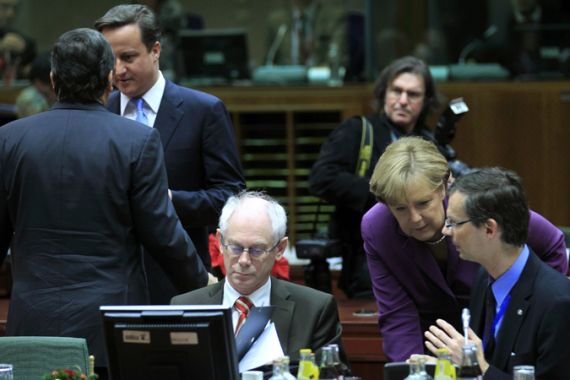Brussels summit rejects EU-wide treaty change
European leaders to press ahead with accord among 17 eurozone states, as talks to include all 27 bloc members fail.

A bid to change the EU treaty to resolve the eurozone debt crisis has foundered at a crunch summit in Brussels, after Britain refused to sign up without major concessions in return.
All EU states, bar Britain, are agreed in principle to taking part in a new eurozone “fiscal compact” tightening budgetary discipline, an EU statement said Friday.
Keep reading
list of 4 itemsEcuador weighs security, international arbitration in latest referendum
‘Triple spending’: Zimbabweans bear cost of changing to new ZiG currency
Boeing hit with 32 whistleblower claims, as dead worker’s case reviewed
Hungary had originally voiced its reluctance, while Sweden and the Czech Republic were undecided. But a statement said all nine non-euro nations had “indicated the possibility to take part in this process after consulting their parliaments where appropriate”.
French President Nicolas Sarkozy said the 17 nations in the eurozone would now press ahead to approve an inter-governmental treaty among themselves, setting a March deadline.
The key item on the agenda during overnight talks was a Franco-German plan on a tighter fiscal controls with automatic penalties for eurozone nations that overspend.
Reports say Berlin and Paris failed to secure backing from all 27 EU members to change the bloc’s treaties to proceed with reforms.
Herman Van Rompuy, president of the European Council, the president of the European Council, said the 17 eurozone states, plus six other EU states, would press ahead with a new accord.
French President Nicolas Sarkozy said early he would have preferred a treaty among all the members of the EU, but he could not because of the British position. He said the new accord should be ready by March.
Sarkozy said “we could not accept” the British proposal that they be exempted from certain financial regulation because a lack of sufficient regulation caused the current problems.
The British Prime Minister David Cameron said: “What is on offer isn’t in Britain’s interests so I didn’t agree to it. Of course we want the eurozone countries to come together and to solve their problems. But we should only allow that to happen inside the European Union treaties if there are proper protections for the single market and for other key British interests. Without those those safeguards, it is better not to have a treaty within a treaty but to have those countries make their arrangements separately. “
Al Jazeera’s Tim Friend, reporting from Brussels, said: “It’s now pretty clear, they have been unable to reach a concensus amongst the 27 EU members, so they might now carve an agreement amongst the 17 nation eurozone members.”
Repeated warnings
With the euro already down against the dollar and stocks hit hard from New York to Tokyo, Prime Minister Donald Tusk of current EU chair Poland had warned beforehand that failure to convince Britain to sign up would mean the “coffin” for post-World War II integration of the EU.
|
Al Jazeera’s Tim Friend explains the financial results of the EU summit in Brussels |
After repeated warnings from London, the decision to change track came after Cameron demanded paybacks such as a veto on EU financial regulation that partners were not prepared to grant.
Cameron has vowed to protect the City of London, with France and Germany leading EU moves to impose a financial transactions tax which the British prime minister says would hit the UK the hardest.
“We’ve always said we would do it at 17 if it didn’t work at 27. That’s what happened,” one senior EU diplomat told the Reuters news agency.
The summit agreed on automatic sanctions for euro area deficit offenders unless three-quarters of states vote against the move, and approved a new fiscal rule on balanced budgets to be written into national constitutions.
After nearly 10 hours of talks running into the early hours of Friday morning, they also decided that the currency bloc’s future permanent bailout fund, the ESM, would be capped at $666bn, as Germany had insisted.
It will also not get a banking licence, which would have allowed it to draw on European central Bank (ECB) funds to increase its firepower, another move Germany objected to.
‘Golden rule’
The summit in Brussels appeared to have already been undermined early on Thursday by an ECB warning that there will be no big boost in rescue funding.
On Thursday, leaders took tentative steps to implement a so-called “golden rule” asking countries to set balanced budgets until debt levels drop, although this was only agreed “in principle” with political wriggle room remaining, diplomats said.
Difficult talks running overnight began on a sour note when ECB president Mario Draghi, who joined pre-summit negotiations with a restricted power group of Germany, France and leading EU officials, sent stock markets falling.
Draghi said hoped-for ECB action to buy up the sovereign bonds of debt-wracked countries was “limited” and “temporary”.
Over the past two years, bond traders have driven up borrowing costs for a succession of eurozone countries.